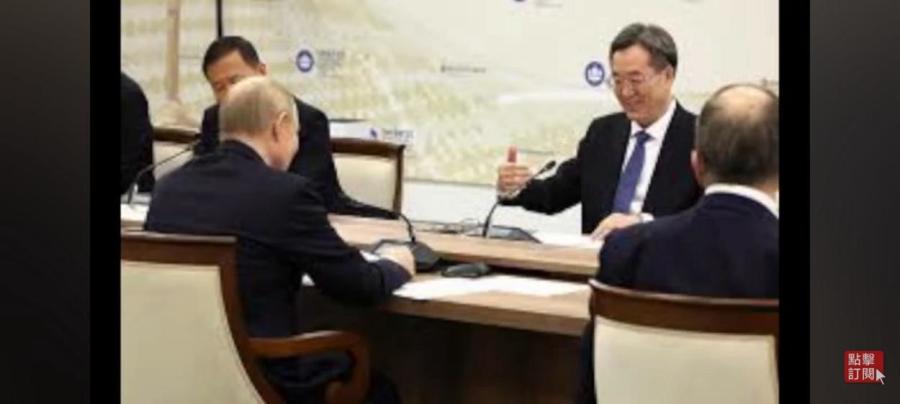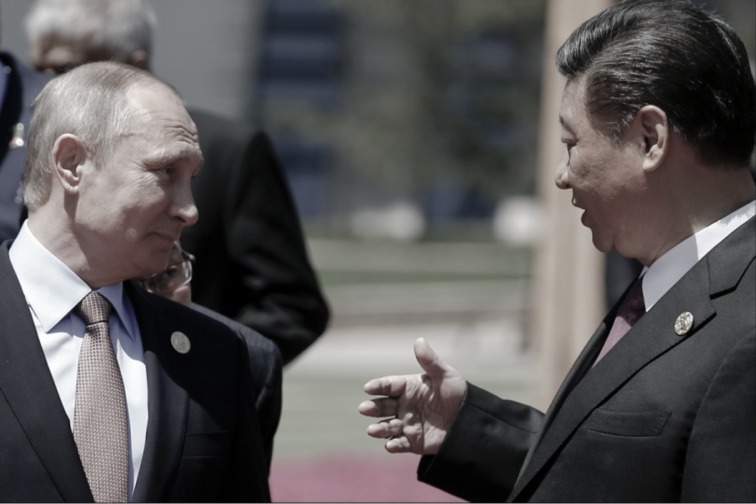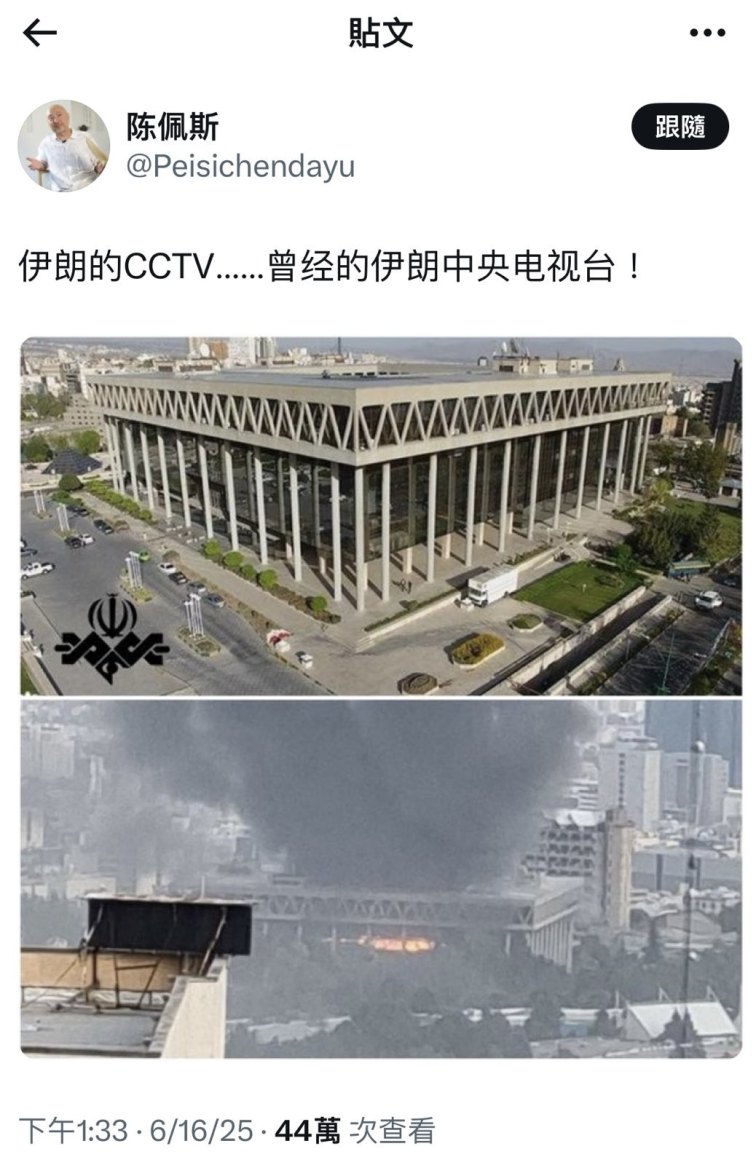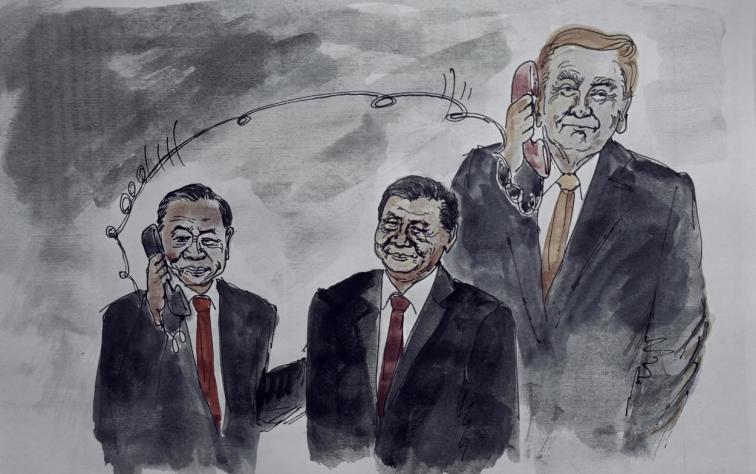On June 20, Ding Xuexiang, a member of the Standing Committee of the CCP Politburo and Vice Premier of the State Council, met with Russian President Vladimir Putin in St. Petersburg. (Video screenshot)
[People News] Recently, there has been growing speculation about Xi Jinping potentially stepping down and who might succeed him. On June 21, all major CCP state media outlets reported that Ding Xuexiang, a member of the CCP Politburo Standing Committee and Vice Premier, met with Russian President Vladimir Putin in St. Petersburg on June 20. There have also been rumors that Ding Xuexiang is competing with Wang Yang and Hu Chunhua to become the next General Secretary. Some analysts believe Ding’s unexpected visit to Russia and meeting with Putin reveal two key signals: first, Xi Jinping’s health is rapidly deteriorating; second, Ding Xuexiang may be the chosen successor.
On June 20, CCP media reported that on June 19, Ding Xuexiang attended the 28th St. Petersburg International Economic Forum and met with Russian Deputy Prime Minister Novak. On June 21, outlets like People's Daily Online, Xinhua News Agency, and the official Chinese government website (run by the State Council General Office) all prominently reported Ding’s meeting with Putin.
Independent commentator Chen Pokong analyzed on his program that while Ding Xuexiang’s visit was nominally to attend the international economic forum, there was another underlying purpose—sending two major signals.
First, Ding made some subtle yet meaningful remarks during his meeting with Putin that conveyed major information, essentially revealing his identity as Xi’s designated successor. Ding is the successor favored by Xi Jinping.
Second, it also suggests that Xi Jinping's health is in serious decline. Due to his physical condition, he can only attend a limited number of diplomatic events. For example, after participating in the Central Asia Summit, he reportedly needed a long period of rest.
Chen Pokong pointed out that based on the seating arrangement during Ding’s meeting with Putin, this visit was symbolically significant. In past visits to Russia by senior CCP officials—unless it was Xi himself—Putin would typically sit at the head of the table while CCP officials like Li Shangfu, Zhang Youxia, or others sat on the sides, implying an inferior status similar to Russian ministers. However, in this meeting, Putin and Ding sat face-to-face, indicating an equal-level discussion. Chen believes this setup carries major symbolic weight.
Furthermore, during the conversation, Ding said: “The steering and guidance by President Xi Jinping and President Putin is the greatest guarantee for deepening China-Russia cooperation and continuing our friendship for generations to come.” Chen Pokong believes that the phrase “friendship for generations” was deliberately chosen and highly suggestive. Ding was signaling that he is the successor.
“This generation of Xi Jinping and the generation of Ding Xuexiang—this expresses continuity. Xi has chosen Ding as his successor, and Putin acknowledges and supports it. Ding was speaking with hidden meaning,” said Chen.
In recent days, several supposed lists of successor candidates have emerged: Wang Yang from the Communist Youth League faction becoming General Secretary, Hu Chunhua becoming Premier; or names like Chen Jining and Li Qiang being considered. There’s also speculation that Wang Huning might act as interim General Secretary. Among these, a Youth League faction successor would be more acceptable to the international community.
“Xi Jinping will try to bargain,” said Chen Pokong. Among these potential successors from the 1960s generation, Xi will pick the “shortest,” meaning the weakest. Ding Xuexiang has the thinnest resume—no regional leadership experience and weakest abilities—which makes him easily controllable. “When Xi steps down, he could act as a behind-the-scenes power holder, letting Ding be a puppet figurehead,” said Chen.
Chen concluded: if Xi Jinping is to step down, he’ll set a condition—that Ding Xuexiang must succeed him. That way, Xi can remain in control behind the curtain until his last breath. “This is Xi’s ideal plan.”
Recently, rumors have surfaced that Wang Yang, Hu Chunhua, and Ding Xuexiang are competing for the General Secretary position. Overseas commentator “Xiao Shuo Jia” believes this could either be a strategic leak to test public reaction or simply disinformation. He argues that the CCP would never allow a “democratic election” for the General Secretary—it’s against the Communist Party’s fundamental organizational principles. Furthermore, Zhang Youxia, who holds military authority, would not agree. Zhang is reportedly more supportive of Wang Yang taking over as General Secretary.
Whether Ding is truly Xi’s man is also widely debated. Outside observers note that within the CCP’s high-level power struggles, there are no permanent enemies or allies. Driven by mutual interests, even enemies can become partners. Moreover, considering Xi’s strongman leadership style, any successor he handpicks would certainly be weak.
Analysts believe that regardless of whether the Youth League faction or someone else takes over, the core issue is that those holding real power are still trapped within the CCP system. Their ultimate goal is to maintain the Communist Party’s ruling status and protect the privileges of the elite. Therefore, even if Xi steps down, and someone else—another “X- Jinping”—takes over, China still lacks true hope and a real future.
(Originally published by People News)











News magazine bootstrap themes!
I like this themes, fast loading and look profesional
Thank you Carlos!
You're welcome!
Please support me with give positive rating!
Yes Sure!